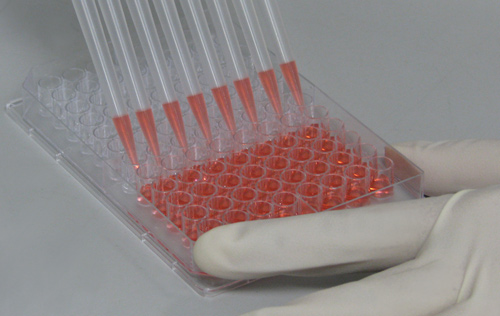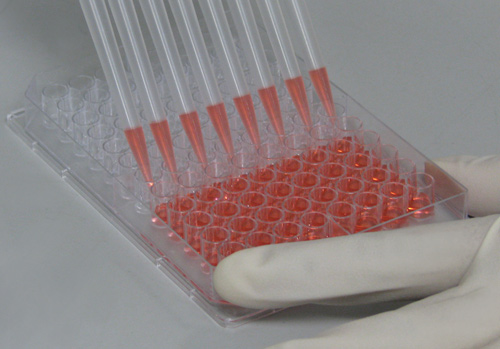January 1, 1970 (Vol. , No. )
Sarah Verna Thermo Fisher Scientific
Christian Oberdanner, Ph.D. Tecan
Take your assays to the edge with these tips.
Cell-based assays are routinely performed throughout the drug discovery process. However, there are issues that need to be overcome, including the edge effect, where cells in wells on the edge of an assay plate behave differently from those in the center.
Here’s a quick look at best practices for maximizing results in all 96 wells of the microplate, with superior cell growth and viability for long-term studies.
- Give it time: Allow the plate to sit for one hour at ambient temperature before placing it in a 37°C incubator. This will allow for a more even distribution of the cells.
- Evaluate the environment: Assess the assay workflow and lab environment. Minimize any temperature gradients or other environmental factors.
- Cover it: Cover plates during incubations. This prevents evaporation. Plastic lids with condensation rings and evaporation rims or breathable seals allow for gas exchange and are recommended when performing cell-based assays.
- Evaporation barrier: Use a plate with proven evaporation barrier, which will allow you to utilize all 96 wells of your assay plate, eliminate the edge effect, and ensure your cells grow under normal physiological conditions.
- Temperature plan: Accurately controlling temperature is crucial to maintaining cell viability and successful cell-based assays.
- pH plan: Regulate CO2 levels to maintain the pH of the cell media. Without CO2 regulation, cells die after a couple of hours in the reader.
- Keep it constant: Avoid moving the plate in and out of the 37°C incubator. Too much movement will cause the edge of the plate to heat or cool at a different rate than the center.
- Mimic conditions: Keep anaerobe and microaerophilic microorganisms alive by regulating O2 levels. This will mimic the conditions found in blood, and establish hypoxia and ischemia in vitro models.
Want more on media and cell culture? Check out “Media’s Role in Cell Culture Success” from our April 1 issue!

New techniques help researchers reduce edge effects on cell-based assays to increase assay performance and improve long-term cell-based kinetics.
Sarah Verna is product manager of drug discovery at Thermo Fisher Scientific, and Christian Oberdanner, Ph.D., is marketing application specialist detection at Tecan.


